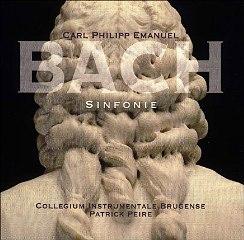Carl Philipp Emanuel Bach - Sinfonie (Peire) [2006]
Carl Philipp Emanuel Bach - Sinfonie (Peire) [2006]

Sinfonia Wq 176 1. Allegro assai 2. Andante 3. Presto Sinfonia Wq 178 4. Alllegro assai 5. Andante moderato 6. Allegro Sinfonia Wq 183, Nr.1 7. Allegro di molto 8. Largo 9. Presto Sinfonia Wq 183, Nr.2 10. Allegro di molto 11. Larghetto 12. Allegretto Sinfonia Wq 183, Nr.3 13. Allegro di molto 14. Larghetto 15. Presto Sinfonia Wq 183, Nr.4 16. Allegro assai 17. Poco andante 18. Presto Collegium Instrumentale Brugense Patrick Peire – conductor
The year 2014 could prove to be significant for the legacy of Carl Philipp Emanuel Bach. The second surviving son of the great Johann Sebastian Bach was born on March 8, 1714, and a flurry of events worldwide will commemorate the 300th anniversary of his birth. Six cities in Germany will hold celebrations this year, with the most extensive in Hamburg, where C.P.E. Bach spent the last twenty years of his life.
To appreciate the influence that C.P.E Bach had on his contemporaries and later composers, it is helpful to examine his life. Emanuel Bach was trained thoroughly in music by his father, but both parent and son realized that a university education was necessary in order to obtain a high-ranking court position. Once Emanuel had his law degree, he was free to pursue composition as part of his duties as court cembalist in the orchestra of Friedrich II (later Frederick the Great) in Berlin. This position allowed him time to compose numerous works, many for the clavier (a predecessor of the piano).
One of C.P.E. Bach’s lasting gifts to the music world was his treatise on playing keyboard instruments. It is difficult for us to imagine now, but at that time, the thumbs were not used in keyboard playing. Emanuel encouraged use of the thumbs and argued for their necessity in order to create effortless technique.
In his mature years, Emanuel became more interested in writing choral music, most likely because he succeeded Georg Philipp Telemann (his godfather and partial namesake) as director of music in Hamburg in 1768. The increased workload called for music to fill 200 concerts per year, so he created many new works and settings, most using existing materials. Along with being a prolific composer, Emanuel was also a shrewd businessman and exerted careful control over the publishing of his keyboard and choral works. He died in Hamburg in 1788 at the age of 74.
C.P.E. Bach, like his music, was full of complexity, passion, intellect, and subtle wit. Many later composers, such as Beethoven, lauded his skills. Is it possible that many concertgoers did not appreciate this special music that was ahead of its time? If so, modern audiences will enjoy renewed opportunities this year to reflect on the impressive quality of C.P.E. Bach’s collective works.
Yes, he had an amazingly brilliant father, but Emanuel’s reputation still stands firmly on its own 300 years after his birth. --- blogs.jwpepper.com
download: uploaded yandex 4shared mediafire solidfiles mega filecloudio nornar ziddu








